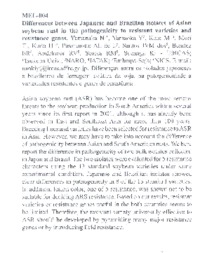Differences between Japanese and Brazilian isolates of Asian soybean rust in the pathogenicity to resistant varieties and resistance genes.
Differences between Japanese and Brazilian isolates of Asian soybean rust in the pathogenicity to resistant varieties and resistance genes.
Author(s): YAMANAKA, N.; YAMAOKA, Y.; KATO, M.; MORI, T.; KUDO, H.; PASSIANOTTO, A. L. de L.; SANTOS, J. V. M. dos; BENITEZ, E. R.; ABDELNOOR, R. V.; SOARES, R. M.; SUENAGA, K.
Summary: Asian soybean rust (ASR) has become one of the most serious threats to the soybean production in South America within several years since its first report in 2001, although it has already been observed in East and Southeast Asia for more than 100 years. Breeding lines and varieties have been selected for resistance to ASR in Asia. However, we may have to take into account the difference of pathogenicity between Asian and South American rusts. We here report the difference in pathogenicity of two bulk isolates collected in Japan and Brazil. The two isolates were evaluated for 5 resistance characters using the 13 standard soybean varieties under same experimental condition. Japanese and Brazilian isolates showed clear differences in pathogenicity in 8 of the 13 standard varieties. In addition, lesion color, one of 5 resistance, was shown not to be suitable for deciding ARS. Based on our results, resistant varieties or resistance genes useful in the both countries seems to be limited. Therefore, the resistant variety universally effective to ARS should be developed by pyramiding many major resistance genes or by introducing field resistance.
Publication year: 2008
Types of publication: Journal article
Unit: Embrapa Soybean
Keywords: Soja
Observation
Some of Embrapa's publications are published as ePub files. To read them, use or download one of the following free software options to your computer or mobile device. Android: Google Play Books; IOS: iBooks; Windows and Linux: Calibre.
Access other publications
Access the Agricultural Research Database (BDPA) to consult Embrapa's full library collection and records.
Visit Embrapa Bookstore to purchase books and other publications sold by Embrapa.

